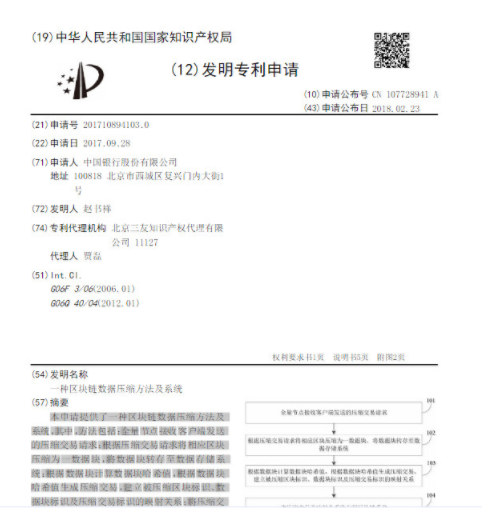According to recent reports, a document released by the State Intellectual Property Office (SIPO) revealed that the Bank of China has filed a patent related to blockchain expansion. This is not the first time the bank has shown interest in blockchain technology. The patent addresses a critical issue: as blockchain transaction data continues to grow, it can lead to storage constraints, making scalability an essential challenge.
With the growing popularity of cryptocurrencies like Bitcoin, the underlying blockchain technology has gained more attention. As a result, an increasing number of enterprises are exploring and adopting blockchain solutions. Among them is the Bank of China, one of China's four major state-owned commercial banks, which has been actively involved in blockchain innovation.
On February 24, according to documents published by SIPO on Friday, the Bank of China submitted its first blockchain expansion patent on September 28, 2017. This move highlights the bank’s long-term commitment to developing scalable and efficient blockchain systems.

The patent application outlines a method for compressing blockchain data. It involves receiving compressed transaction requests from clients, compressing corresponding blocks into data blocks, and transferring them to a storage system. The system then calculates a hash value for each data block, generates a compressed transaction, and establishes a mapping between identifiers. These compressed transactions are then published to the blockchain network, ensuring traceability while reducing storage demands.
In traditional blockchain systems, data is stored in blocks with predefined size limits. For example, Bitcoin’s block size is capped at 1MB. While this helps maintain security and decentralization, it also creates bottlenecks when transaction volumes increase.
Small block sizes can slow down transaction processing and create delays, especially as usage grows. This inefficiency leads to longer confirmation times and higher fees, which hinders widespread adoption. Therefore, blockchain expansion is vital for supporting larger transaction volumes without compromising performance or security.
It’s worth noting that the Bank of China has been exploring blockchain technology for some time. In the first half of 2017, the bank launched BOCwallet, a blockchain-based e-wallet, and partnered with Tencent to pilot financial applications using blockchain. These initiatives show the bank’s ongoing efforts to integrate blockchain into its services and improve efficiency in the financial sector.
Binding Adapter ,Amplifier Terminal Connector,Binding Post Connectors,Spring Loaded Binding Post
Changzhou Kingsun New Energy Technology Co., Ltd. , https://www.aioconn.com